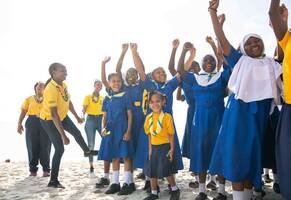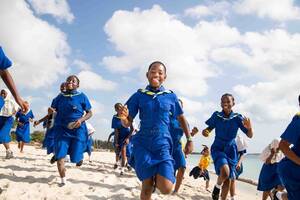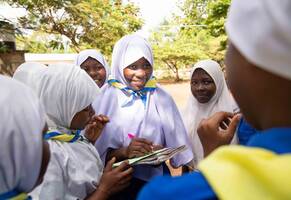Girl-led Action on Climate Change in Africa
Did you know that there are more than 10 million girl guides and girl scouts in 152 countries in the world? Did you also know that their movement has been building girls of courage, confidence and character who have been making the world a better place for more than 100 years? It's no surprise that these girls and young women want to fight the global climate crisis.
Recognising this, FAO, through the Youth and United Nations Global Alliance (YUNGA) is collaborating with the World Association of Girl Guides and Girl Scouts (WAGGGS) in Sub-Saharan Africa, specifically in Benin, Lesotho and Tanzania, to educate and empower girls and young women to lead effective climate action in their communities.
Climate change is one of the greatest threats we face today, and women are increasingly being affected by the impacts of climate change than men. More extreme and less predictable weather patterns and increased food and water insecurity combine with gender inequality to leave women more vulnerable.

- Photo credit: Roshni Lodhia
WAGGGS, with a membership of 10 million members, has been a key partner with FAO for over 25 years, working together to engage and empower girls and young women to be active agents of change and to build the global citizens of tomorrow. This long-term collaboration is marked by a pomegranate tree planted on the FAO HQ campus many years ago.
What is being done:
FAO has put at the core its challenge badge action approach, in particular the YUNGA Challenge Badge on climate change. It is an educational resource which has been empowering young people in over 100 countries to become positive drivers of change on the climate arena since 2015.
Based on YUNGA badge and with technical support from FAO, the Girl-Led Action on Climate Change badge has been co-created with girls from Benin, Lesotho, Tanzania. It represents girls' voices and their call to action for us all to take urgent action on climate change.
Using this new Girl-Led Action on Climate Change curriculum, tens of thousands of girls and young women are being educated on climate change and its gender dimension. To pay it forward, each young woman then shares information and skills learnt with at least two community members and leads on a community action project of their choice. A select group of young women are also being trained - and mentored - to carry out advocacy campaigns at a national level and to participate in global summits, such as the UNFCCC Conference of Parties (COP) and the UN Commission on the Status of Women (CSW).
What will be achieved:
1. GIRLS AND YOUNG WOMEN WILL BE MORE RESILIENT TO THE IMPACTS OF CLIMATE CHANGE
Through the curriculum, girls and young women will learn about how to adapt to and mitigate climate change through practical interactive activities. They will also learn about its gender dimension and apply what they've learnt to their own lives, and their families' lives, contributing to greater community resilience to climate change.
2. GIRLS AND YOUNG WOMEN WILL BE ACTIVELY ENGAGED IN COMMUNITY ACTION TO MITIGATE AND ADAPT TO CLIMATE CHANGE
Through structured support and micro-grants, each young women will implement a grassroots project to tackle an issue of climate change in their community. In the long term, girls and young women will be better equipped to enter and occupy positions of leadership where their perspectives on climate change will be heard and respected.
3. GIRLS AND YOUNG WOMEN WILL INFLUENCE THOSE MOST RESPONSIBLE TO TAKE ACTION
Girls and young women will gain the knowledge and skills needed to put pressure on their governments - and international institutions - to increase their commitments to and actions towards tackling climate change in a gender sensitive way. At key global events such as the UNFCC Conference of the Parties (COP) and the Commission on the Status of Women (CSW), girls and young women will also have the opportunity to share their lived experiences of climate change and influence climate action internationally.
FAO is also keen to provide active support to improve monitoring and evaluation of the project. “Innovative M&E, tools and indicators will help to measure and showcase the long-term behaviour change impacts that this and other educational programmes and initiatives are having. This will eventually help national girl guide associations win the support of decision makers and attract more resources to fund and upscale future similar initiatives”, Reuben Sessa added.

- Photo credit: Roshni Lodhia

